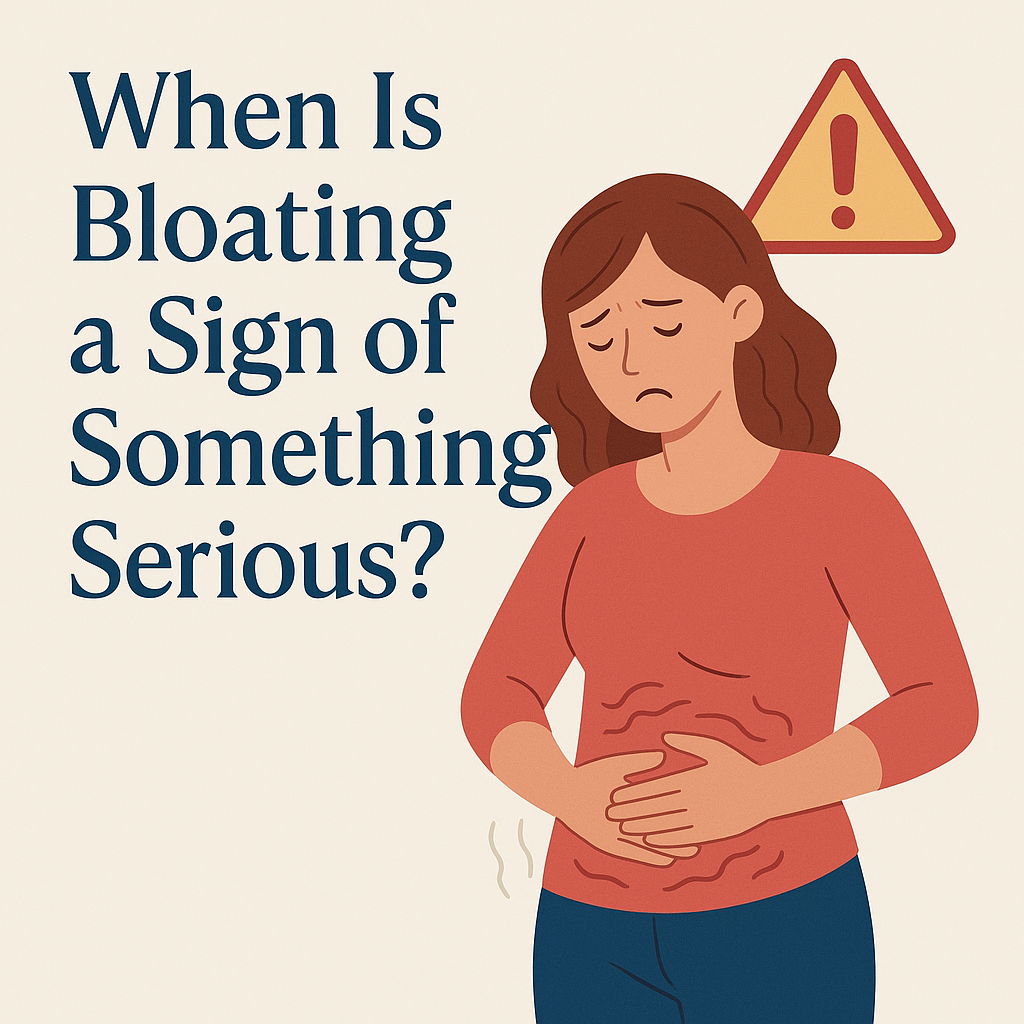
⚠️ Affiliate Disclaimer: This post may contain affiliate links, which means I may earn a small commission — at no extra cost to you — if you make a purchase through one of these links. I only recommend products or services I genuinely trust and believe can provide value. Thank you for supporting My Medical Muse!
10 Alarming Signs: When Is Bloating a Sign of Something Serious?
Bloating is one of those symptoms we often brush off, we chalk it up to overeating, gassy foods, or “just that time of the month”, but what if your bloating is more than just a temporary nuisance?
In some cases, bloating is the body’s way of whispering that something deeper might be wrong and sometimes, it’s not whispering, it’s screaming for your attention.
In this article, you’ll learn how to tell the difference between harmless bloating and the kind that may signal a more serious condition like ovarian cancer, IBS, or liver disease.
Table of Contents:
What Is Normal Bloating?
Bloating is that uncomfortable sensation of fullness, tightness, or swelling in your abdomen. It often comes with gas, burping, a distended belly, temporary digestive discomfort. It’s incredibly common especially after eating high-fiber foods, drinking carbonated beverages, or during menstruation.
Normal bloating, improves within a few hours to a day, Is relieved by passing gas or bowel movements and usually linked to specific triggers (like food or hormones). But what if it doesn’t go away… or comes with other red flags?
When Should You Be Worried?
You should start paying closer attention when bloating is:
- Persistent (lasting more than a few days or weeks)
- Painful or gets progressively worse
- Associated with other symptoms like weight loss, blood in stool, or changes in appetite.
Let’s dive deeper into the signs that your bloating might be a red flag and not just an after-dinner annoyance.
10 Serious Causes of Bloating You Shouldn’t Ignore
Ovarian Cancer
Ovarian cancer is nicknamed the “silent killer” because its early signs are often dismissed as harmless bloating. Medically we explain the reason why ovarian cancer is often detected during uts advance stage because the ovary is located at a location with enough space, so growth often go undetected until it is too late, or picked during routine or random abdominal ultrasound scan done. Bloating can be a symptom of ovarian cancer or cyst.
Watch for:
- Persistent bloating (daily, not occasional)
- Feeling full quickly when eating
- Pelvic or abdominal pain
- Unexplained weight loss
Women over 40, especially those with a family history of ovarian or breast cancer, should pay extra attention to these signs.
Irritable Bowel Syndrome (IBS)
IBS is a chronic gut disorder that causes bloating, abdominal pain, and irregular bowel habits. It is a inflammatory disease involving the gut lining causing issues with absorption of nutrients and intestinal motility.
Red flags include:
- Bloating that comes and goes with constipation or diarrhea.
- Abdominal cramping that improves after pooping.
- Mucus in the stool.
IBS bloating can be worsened by stress, food sensitivities (like FODMAPs), certain drugs or even hormonal changes.
Celiac Disease
This autoimmune condition causes your body to attack itself when you eat gluten. The result? Inflammation, bloating, and long-term nutrient malabsorption.
Symptoms:
- Chronic bloating after eating bread, pasta, or baked goods
- Fatigue and weight loss
- Frequent diarrhea or greasy stools
- Untreated celiac disease can damage your gut lining and lead to vitamin deficiencies.
Small Intestinal Bacterial Overgrowth (SIBO)
SIBO happens when bacteria that should live in your large intestine overgrow in your small intestine.
Signs to look for:
- Bloating that gets worse as the day goes on.
- Gas and belching
- Nutrient deficiencies
- Brain fog
Many people with SIBO notice they “look pregnant” by evening. Stool tests and breath tests help confirm it.
Pancreatic Insufficiency
If your pancreas isn’t making enough enzymes, you won’t digest fats properly leading to bloating and greasy, floating stools.
Warning signs:
- Feeling bloated and heavy after fatty meals.
- Pale, foul-smelling stool
- Unintentional weight loss
This is common in people with chronic pancreatitis or long-standing diabetes.
Liver Disease or Ascites
Bloating can also be caused by fluid buildup in the abdomen, known as ascites a complication of liver damage.
Signs of liver-related bloating:
- Swollen belly with visible veins
- Yellowing of the eyes (jaundice)
- Fatigue and nausea
- History of hepatitis, alcohol use, or fatty liver disease
- Itching of the skin
This type of bloating won’t fluctuate with food and usually gets progressively worse, it can be associated in swelling on the foot.
Bowel Obstruction
A blockage in the intestines can trap gas and fluids, causing extreme bloating and abdominal swelling.
Emergency signs:
- Sudden, severe bloating and cramping
- Inability to pass stool or gas
- Vomiting (often of fecal-smelling material).
This is a surgical emergency, especially if caused by tumors or twisted intestines.
Endometriosis
In women, bloating that fluctuates with the menstrual cycle may signal endometriosis, where uterine tissue grows outside the uterus.
Other clues:
- Painful periods and ovulation
- Pain during sex or bowel movements
- Infertility
Some women call it “endo belly” a bloated, painful tummy that worsens mid-cycle or during menstruation.
Read More About Endometriosis.
Colon Cancer
Colon cancer can cause bloating by partially blocking the bowel or slowing transit.
Danger signs:
- Bloating with blood in stool (hematochezia)
- Persistent change in bowel habits (diarrhea or constipation)
- Fatigue and unexplained weight loss
- Feeling like you can’t fully empty your bowels
If you’re over 45 or have a family history of colon cancer, these symptoms should never be ignored.
Gastroparesis
This is a condition where your stomach empties food too slowly, causing bloating, nausea, and early fullness.
Key signs:
- Feeling bloated right after eating
- Vomiting undigested food hours after a meal
- Acid reflux and poor appetite
- Common in people with diabetes
- Gastroparesis can be triggered by nerve damage, medications, or chronic illnesses.
What Doctors Look for When Evaluating Bloating.
If you’re experiencing persistent or severe bloating, a healthcare provider may:
- Take a detailed history of your diet, menstrual cycle, and bowel habits
- Do a physical exam to check for fluid, swelling, or masses
- Order blood tests (CBC, liver enzymes, celiac panel)
- Recommend imaging (ultrasound, CT scan) or endoscopy
- Suggest stool or breath tests to rule out SIBO, parasites, or infections
- Your pattern of bloating (timing, triggers, duration) is just as important as the bloating itself.
When to See a Doctor Immediately
Call your doctor or go to the ER if your bloating is accompanied by:
- Severe or sharp abdominal pain
- Bloody stools or black, tarry poop
- Unexplained weight loss
- Persistent vomiting
- Yellow skin or eyes (jaundice)
- Fever and chills
- Inability to pass stool or gas
These are not normal signs and may indicate a medical emergency.
Final Thoughts: Trust Your Gut
Occasional bloating after a heavy meal is one thing, but if your bloating keeps coming back, sticks around for weeks, or shows up with other weird symptoms don’t just pop an antacid and hope for the best.
You know your body better than anyone. If something feels off, it probably is. Trust your gut literally , listen to it and when in doubt, check it out.
👩⚕️ Need Personalized Health Advice?
Get expert guidance tailored to your unique health concerns through MuseCare Consult. Our licensed doctors are here to help you understand your symptoms, medications, and lab results—confidentially and affordably.
👉 Book a MuseCare Consult Now

